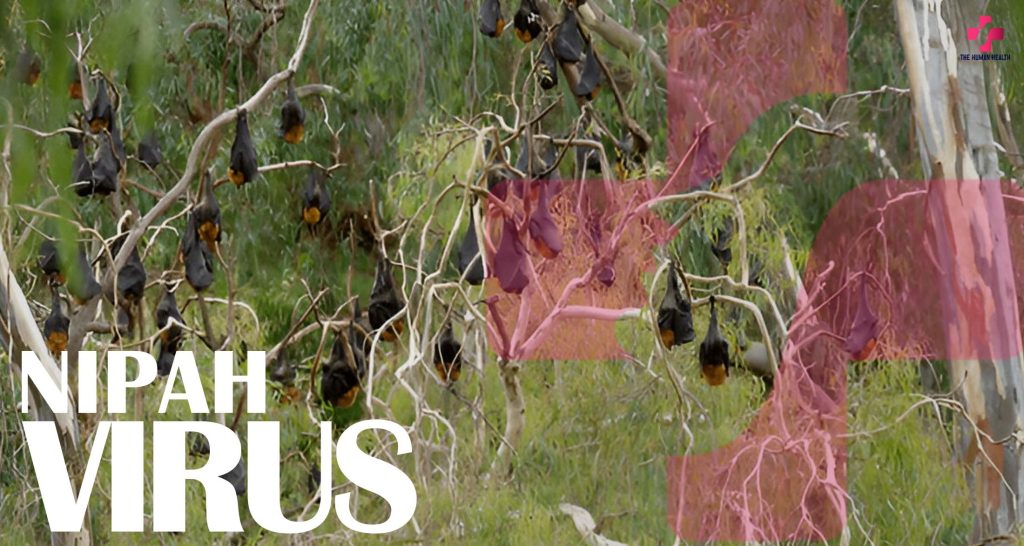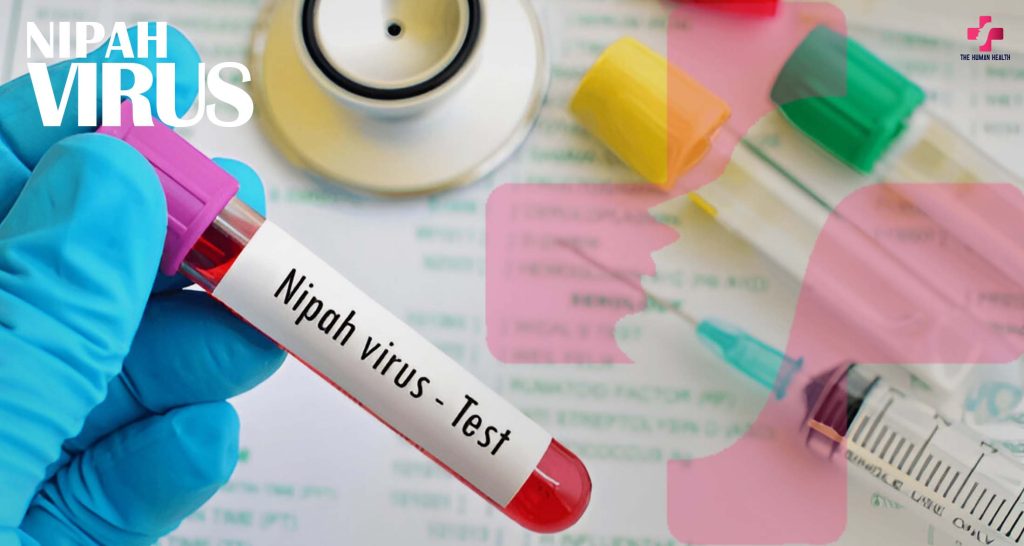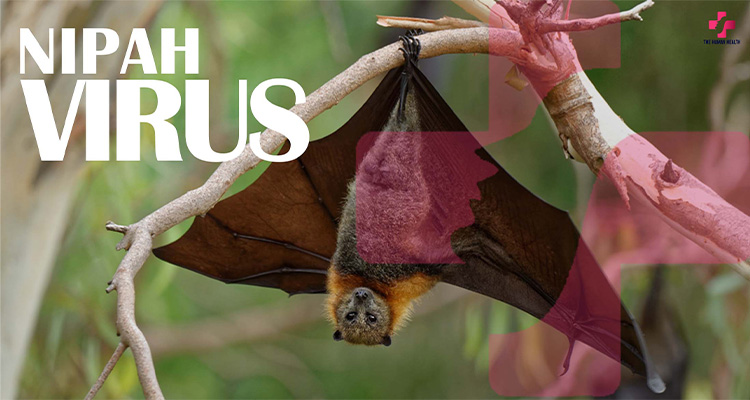Introduction to Nipah Virus
Nipah virus (NiV) is a dangerous virus that can infect both people and animals. It was first found in Malaysia in 1998. Since then, it has caused concern because it spreads between people, is deadly, and has no cure or vaccine. The World Health Organization (WHO) says we need urgent research to stop it
How It Spreads
Nipah virus comes from fruit bats, also called flying foxes. These bats do not get sick, but they spread the virus through their saliva, urine, and poop. The virus can get into food and water.
People can get sick by touching infected animals, eating dirty food, or being near someone who is sick. The first outbreak happened in Malaysia and Singapore when pigs got sick from bats. Later outbreaks in India and Bangladesh happened when people drank raw date palm sap that bats had touched.
Symptoms and Disease
It takes 4 to 14 days for symptoms to appear, but sometimes, it takes longer. At first, it feels like the flu. People may have fever, headache, sore throat, dizziness, muscle pain, and vomiting. But it can get worse. Some people have trouble breathing. Others may get brain swelling, which can cause confusion, seizures, or even coma.
Many people who get Nipah do not survive. The death rate is between 40% and 75%. Some survivors have brain problems, like seizures, even after they recover.
Outbreaks and Risks
The first outbreak was in Malaysia and Singapore in 1998–1999. More than 100 people died, and over a million pigs were killed to stop the virus. Since then, most cases have been in Bangladesh and India. Some cases were found in Cambodia, the Philippines, Indonesia, and Madagascar.
Right now, Nipah does not spread easily from person to person. But experts worry that it could change and become more contagious.
How to Stay Safe
There is no cure or vaccine for Nipah virus. The best way to stay safe is to avoid getting exposed. Here’s what can help:
Do not drink raw date palm sap or eat fruit that may have been touched by bats.
Keep farms clean and stop bats from coming near animals.
Doctors and nurses should wear protective gear when treating sick patients.
People in high-risk areas should learn how to avoid the virus.
Scientists are working on vaccines and treatments. Because Nipah is so deadly, health experts around the world are watching it closely. Acting fast and working together can help stop its spread.
What is Nipah Virus?
Nipah virus (NiV) is a germ that makes people very sick. It comes from animals and can spread to humans. It can cause fever, breathing problems, and brain swelling.
The virus was first found in Malaysia in 1998. Since then, it has spread to other places. It is very dangerous because there is no cure or vaccine.
Where Does Nipah Virus Come From?
Nipah virus comes from fruit bats. These bats do not get sick, but they spread the virus. The virus can be in their saliva, pee, and poop. It can get on fruits and in water.
People can get sick by:
Eating fruit or drinking raw sap that bats touched.
Touching or eating sick animals, like pigs.
Being close to a sick person.
The virus can spread in farms, markets, and hospitals.
Symptoms of Nipah Virus
Symptoms show up in 4 to 14 days. At first, it feels like the flu. A person may have:
Fever
Headache
Sore throat
Vomiting
Muscle pain
Later, it can get worse. Some people have:
Trouble breathing
Brain swelling
Confusion
Seizures
Coma
Many people who get this virus do not survive. The death rate is between 40% and 75%. Some people who live have brain problems later.
History of Nipah Virus Outbreaks
The first outbreak was in Malaysia and Singapore in 1998–1999. It spread from bats to pigs and then to people. Over 100 people died. More than a million pigs were killed to stop the virus.
Most outbreaks after that were in Bangladesh and India. People got sick from drinking raw sap from date palm trees. The virus has also been found in Cambodia, the Philippines, Indonesia, and Madagascar.
Right now, Nipah virus does not spread fast between people. But experts worry that it could change.
How to Stay Safe
There is no cure or vaccine. The best way to stay safe is to avoid getting the virus. Some ways to prevent infection include:
Do not drink raw sap from trees – Bats may touch it. Boiling it makes it safe.
Do not eat fruit that looks bad – Bats may have bitten it.
Wash hands often – This stops germs from spreading.
Keep farms clean – Farmers should keep bats away from animals.
Wear masks and gloves – Doctors and nurses should protect themselves.
Is There Any Treatment?
There is no special medicine for Nipah virus. Doctors can only help by treating symptoms. They may give oxygen for breathing or medicine for fever.
Scientists are working on vaccines. But they are not ready yet. Until then, staying safe is the best way to avoid the virus.
Why is Nipah Virus a Big Problem?
Nipah virus is very dangerous. It spreads from animals to people and has no cure. It kills many people who get it. Experts also worry that it could change and spread faster.
The World Health Organization (WHO) says Nipah virus is one of the top health threats. People must learn about it and take steps to stay safe.

What Does Nipah Virus Do To You?
Nipah virus spreads between animals and people. It was first found in Malaysia in 1998. The virus mostly affected farmers who worked with pigs. Now, it has caused outbreaks in other places, like India, Bangladesh, and the Philippines. The virus is named after the village of Nipah in Malaysia. It can cause a range of illness, from mild to deadly.
How It Spreads and Symptoms
People get the virus from animals like fruit bats or pigs. It can also spread through food that bats have touched, like date palm sap. Sometimes, people can pass the virus to each other, especially in hospitals.
When the virus enters the body, it can cause symptoms within 5 to 14 days. At first, it feels like the flu: fever, headache, and body aches. Later, it can cause confusion and tiredness. Some people may have seizures, brain swelling, or even fall into a coma. In the worst cases, they may die from breathing problems.
Serious Effects
The biggest danger of the Nipah virus is brain swelling. This can cause permanent brain damage, coma, or death. The virus can make the brain swell, which affects a person’s ability to think, move, or control their body.
The death rate from Nipah virus is high, ranging from 40% to 75%. This makes it one of the deadliest viruses.
Diagnosis and Treatment
Diagnosing Nipah virus is hard because its symptoms look like other illnesses, like the flu. Doctors use tests to check for the virus in blood and other samples.
There is no cure for Nipah virus. Treatment focuses on making the patient more comfortable and supporting their breathing. Some medicines have been tested, but they don’t always help. The sooner the virus is found, the better the chances of survival.
Prevention and Control
To avoid getting Nipah virus, people should stay away from animals that may carry it, like bats and pigs. They should also avoid eating food that might be infected. Healthcare workers should wear protective gear to stop the virus from spreading in hospitals.
There is no vaccine for the virus yet, but scientists are working on it. They are also trying to find medicines to treat the virus. However, the virus is complex, making it hard to create a cure.
In conclusion, the Nipah virus is dangerous and can cause death. There is no cure or vaccine yet. The best way tofight it is to catch it early, provide care, and avoid contact with infected animals and food.
Why Does This Happen? – Nipah Virus
Nipah virus (NiV) is a disease that spreads from animals to people. It can make both people and animals very sick. The first outbreak happened in Malaysia in 1998. Since then, the virus has caused more outbreaks in South and Southeast Asia. But why does this happen? Why does the Nipah virus keep coming back, and why is it so dangerous?
- The Role of Bats
Fruit bats, or flying foxes, are the main animals that carry the Nipah virus. They don’t get sick, but they can spread the virus to other animals and people. The virus spreads through their saliva, urine, or feces. These can contaminate fruit, water, or food, which animals or people might eat.
Bats are known for carrying many viruses without getting sick. Their bodies handle these viruses well, but they can still pass them on to other animals or people.
- How It Spreads Between People
The virus can spread from one person to another. This happens when the virus from an infected person’s body fluids, like saliva or blood, touches someone else. Healthcare workers and family members who are close to an infected person are at risk. Hospitals can also be places where the virus spreads if safety steps are not followed. The virus can even spread before someone shows symptoms, which makes it harder to control.
Human-to-human spread is less common than with some other viruses, but it is still a big concern.
- Farming and the Environment
People and animals often come into contact because of farming. In areas where pigs live near bat-infected fruit trees, pigs can get the virus from the bats. Then, pigs can pass the virus to people. This happened during the 1998 outbreak in Malaysia, when pigs ate contaminated fruit and spread the virus to people.
As humans cut down forests and change land use, bats and people come into contact more often. This makes it easier for viruses to spread from wild animals to domestic animals and humans.
- Why It Makes People Sick
The virus can cause serious problems. It can lead to brain swelling (encephalitis) and breathing problems, both of which can be deadly. People may have seizures, confusion, and even fall into a coma. The death rate is high, between 40% and 75%, making it very dangerous.
It also harms the lungs, which makes it hard to breathe. The virus can be hard to treat because it causes both brain and lung problems at the same time.
- Why It Comes Back
The virus keeps coming back because of many factors. Bats carry the virus and spread it to animals and people in different ways. This makes it easy for the virus to show up again. Poor virus tracking, slow responses, and a lack of medicine to treat it make it harder to stop.
In conclusion, the Nipah virus keeps coming back because of how it spreads through animals and people. To stop it, we need better health responses, tracking, and understanding of the environment where the virus spreads.

What is The Name of The Vaccine For Nipah Virus?
Right now, there is no vaccine for the Nipah virus. It mainly affects animals but can also spread to people. The virus can make people very sick and can even kill them. It was first found in 1998 during an outbreak in Malaysia. It has since spread to other countries like Bangladesh and India. People can get the virus by touching sick animals, like fruit bats, or by eating unsafe foods, like raw fruit juice or sap.
Even though there is no vaccine, scientists are working hard to make one. It is hard to make a vaccine because the virus is dangerous, and it can spread in places with lots of fruit bats. Groups like the World Health Organization (WHO) are trying to find a way to stop the virus from spreading.
Some researchers are testing vaccines. One vaccine was made by the U.S. National Institute of Allergy and Infectious Diseases (NIAID). It has worked well in animals, but it still needs more tests before it can be used by people.
Besides vaccines, scientists are also trying to find treatments for people with Nipah virus. Right now, there are no special medicines for it. Doctors give people support, like helping them breathe, but there are no approved drugs for this virus yet.
The WHO and other groups are watching for outbreaks of the virus. They work to find the virus early and stop it from spreading. In areas where it has spread, people use measures like keeping animals in one place, tracking who has been in contact with the virus, and keeping people safe. They also watch places where bats live, to stop future outbreaks.
While we don’t have a vaccine yet, the work scientists are doing is encouraging. Until a vaccine is ready, the best way to prevent the virus is to stay away from sick animals and unsafe foods. Educating people about the virus is also important to keep them safe.
In short, there isn’t a vaccine for the Nipah virus yet, but scientists are hopeful. Health organizations are working hard to prevent and treat the virus and protect people from future outbreaks.
What Can Be This Harm? Nipah Virus
Nipah virus is a disease that can hurt people. It was first found in Malaysia in 1998. It made people and pigs sick with brain swelling. The virus has also spread in places like India, Bangladesh, and the Philippines. While it’s rare, it can spread fast and make people very sick, which makes it dangerous.
The virus comes from a group of viruses called Paramyxoviridae. Fruit bats, or flying foxes, carry it. When the bats touch fruit, the virus spreads through their saliva, urine, or droppings. If people eat this fruit or touch bats or pigs, they can get sick.
At first, the symptoms are fever, headache, dizziness, and vomiting. Some people get brain swelling, trouble breathing, confusion, or seizures. Some even die in a few days. The virus can kill up to 75% of people who get it, which is very high.
The virus can spread from one person to another. It can travel through droplets in the air, direct contact with fluids, or by touching things with the virus on them. This makes the virus spread faster in places like hospitals or communities where people are close to each other.
There is no cure or vaccine for the virus yet. Doctors help by easing the symptoms and giving support, like helping people breathe. There are no proven medicines to treat it.
To stop the virus, health workers find sick people early, track anyone they were close to, and isolate them. They also tell people to stay away from bats and pigs. Teaching people how to avoid getting sick is important too.
Even though the virus is rare, the number of cases is growing. It can cause a lot of harm, especially in places where healthcare is weak. With no cure or vaccine, we must stay alert and work on finding ways to stop it.

Can Anyone Get The Nipah Virus?
Nipah virus (NiV) is a rare but serious virus. It can spread from animals to humans. It was first found in Malaysia in 1998. Pig farmers and those in contact with sick animals got it. Since then, there have been outbreaks in countries like India, Bangladesh, and the Philippines.
So, can anyone get the Nipah virus? Does age make a difference? Let’s look at how the virus spreads and who is at risk.
How It Spreads
Nipah virus spreads from fruit bats to humans. The bats can spread the virus through their saliva, urine, or poop. It can also spread from pigs or contaminated food. Humans can get it by touching infected animals or eating unsafe food.
The virus can also spread between people. If you touch someone’s saliva, urine, or blood, you might get sick too. Hospitals have seen outbreaks because of this.
Anyone can get the virus if they are in contact with an infected person or animal. But some people are more at risk.
Age and Health Risks
Even though anyone can get the virus, age and health matter. Children, older adults, and people with health problems are more likely to get very sick.
Children: Kids are at higher risk for serious problems, like brain swelling. Their immune system is not as strong as adults, so they have a harder time fighting the virus. Sadly, children may have a higher risk of dying from Nipah virus.
Adults: Adults can get mild or severe symptoms. They tend to survive more often than children, but they still face serious problems, like brain swelling and breathing issues. Some adults might have long-term problems or get sick again after they seem better.
Older Adults: Older people, especially those with health problems like diabetes or heart disease, have a harder time fighting the virus. Their immune system is weaker, which makes recovery harder. Older adults are more likely to get very sick from any virus, including Nipah.
Weak Immune Systems: People with weak immune systems, like those with cancer or HIV, are also at high risk. Their body may not be able to fight the virus, making them sicker for longer.
Conclusion
There is no age limit for getting Nipah virus. But age and health do affect how serious the illness is. Children, older adults, and people with weak immune systems are at higher risk for severe illness. Everyone can catch the virus if they are exposed, but some people are more likely to get very sick. Knowing who is most at risk can help us protect people from future outbreaks.
What Are The Signs of This Happening? Nipah Virus
Nipah virus is a virus that can spread from animals to people. It is usually found in fruit bats, which carry the virus. The virus can also spread through infected animals or food, like raw date palm sap. People can spread the virus to each other, too, especially in hospitals. It’s important to know the early signs of Nipah virus to get help right away. Here are the common signs to watch for.
- Fever and Headache
A fever and bad headache are often the first signs of Nipah virus. The fever can start within 5 to 14 days after contact with the virus. The headache is often strong and doesn’t go away. These symptoms are common with many viruses but are usually worse with Nipah virus. - Cough and Trouble Breathing
As the infection gets worse, people may develop trouble breathing, a dry cough, or a sore throat. In some cases, the infection can cause a severe breathing problem called ARDS, where the lungs can’t get enough oxygen. This can make breathing hard and cause other problems. - Brain Swelling
Nipah virus can cause swelling in the brain, known as encephalitis. This can lead to confusion, sleepiness, trouble thinking, and seizures. In some cases, the virus can make people lose awareness, become aggressive, or even fall into a coma. - Dizziness and Vomiting
As the infection worsens, people may feel dizzy, lightheaded, or have trouble standing. Vomiting often comes with these symptoms, which means the virus is spreading in the body. Vomiting along with a headache and fever can be a sign of brain swelling. - Changes in Behavior
The virus can affect the brain, making people confused or act strangely. They might not recognize their family members or understand what’s going on around them. As the virus spreads, these symptoms may get worse and can lead to unconsciousness. - Seizures
Seizures are another sign that the virus is attacking the brain. Seizures can range from small twitches to full-body convulsions. These are serious and often mean the virus is affecting the brain badly. - Stiff Neck and Weak Muscles
People with Nipah virus may feel weak in their arms and legs. This can make it hard to move or do daily things. A stiff neck is also a sign of brain swelling and can cause pain and discomfort. - Risk of Death
In severe cases, Nipah virus can be deadly. The virus can kill between 40% and 75% of those who are infected. Death often happens because the lungs can’t work well or because the brain swells.
Conclusion
The signs of Nipah virus can be mild or severe. Early detection is important for getting treatment. The first signs of Nipah virus are similar to other viral infections, so doctors should ask about travel history and contact with animals. If someone has breathing trouble or brain swelling, they need medical help fast. Because the virus can be deadly, quick treatment can save lives.
What Are The Ways To Avoid This? Nipah Virus
Nipah virus is a very dangerous disease. It spreads from animals to people. The virus can come from bats or pigs. You can also catch it from people who are sick. The symptoms can be mild, like a fever. But it can also cause serious problems, like swelling in the brain. This can be deadly. There is no vaccine or special treatment for it. But there are things you can do to stay safe.
- Stay Away from Sick Animals
Bats carry the Nipah virus, and pigs can spread it too. To stay safe, don’t touch these animals, especially where there have been outbreaks. If you work with animals, like farmers or vets, wear gloves and masks to keep safe. Don’t drink milk from animals unless you are sure it is safe. - Stay Away from Sick People
Nipah virus can spread from one person to another. If someone is sick, avoid them. This will help stop the virus from spreading. People who are sick with Nipah should stay away from others to keep the virus from spreading more. - Wash Your Hands Often
Washing your hands is very important. Use soap and water and wash for 20 seconds. If you can’t wash your hands, use hand sanitizer. Wash your hands after being near animals or things that could be sick. Clean surfaces too, like in your home or car, to stay safe. - Don’t Eat Contaminated Fruit
Bats eat fruit, and they can spread the virus to the fruit. Don’t eat fruit that looks like it’s been bitten or damaged by bats. Always wash fruit well before eating it. - Watch for Outbreaks
In areas where Nipah virus happens, health workers need to watch for the disease early. If they find sick people quickly, they can stop the virus from spreading. It’s also important to watch the movement of animals like pigs that might carry the virus. Everyone should be educated about the virus and how to stay safe. - Wear Protective Gear
People who work with animals or sick people should wear gloves, masks, and face shields. This helps protect them from getting sick. It is very important to stay safe in places like hospitals where the virus can spread easily.
Conclusion
Right now, there is no vaccine for Nipah virus. But you can stay safe by not touching sick animals or people. Wash your hands often, and follow health rules to avoid getting sick. Health workers can help stop the virus by finding sick people fast and keeping them apart from healthy people.
Nipah Virus Conclusion?
Nipah virus is a serious health threat. It can cause outbreaks and has few treatment options. The virus spreads from animals to humans, mostly in parts of Asia. Fruit bats and pigs carry the virus and can pass it to people. The virus can spread from one person to another, making outbreaks harder to stop.
Symptoms of Nipah virus can vary. Some people feel mild illness, while others get serious brain problems. It can lead to coma or death. The virus kills 40% to 75% of people who get it. This shows why it’s important to find and stop the virus quickly. It’s hard to tell the virus apart from others like flu or dengue, so quick action is needed.
One big worry with Nipah is how it spreads between animals and humans. Fruit bats carry the virus and spread it through their saliva, urine, and feces. Pigs can also pass the virus to people. People can get sick from touching infected animals or places. The virus can also spread between people, which makes controlling it harder.
There is no specific treatment for Nipah virus. Doctors can only help with symptoms, like breathing problems. Researchers are working on medicines and vaccines, but there’s nothing available yet. More studies are needed to understand the virus and find a way to stop it.
The virus can change over time, which might make it easier to spread or infect more animals. This could make it harder to control, so it’s important to stay alert.
To prevent the virus, people need to avoid animals that might carry it. In places where the virus is common, it’s important to watch both animals and humans closely. Teaching people about the virus and its symptoms can help stop it from spreading.
In conclusion, Nipah virus is still a serious threat. We need to keep researching, tracking, and working on ways to stop it. The virus spreads easily from animals to humans and kills many people. By improving detection and raising awareness, we can lower the chance of future outbreaks.




